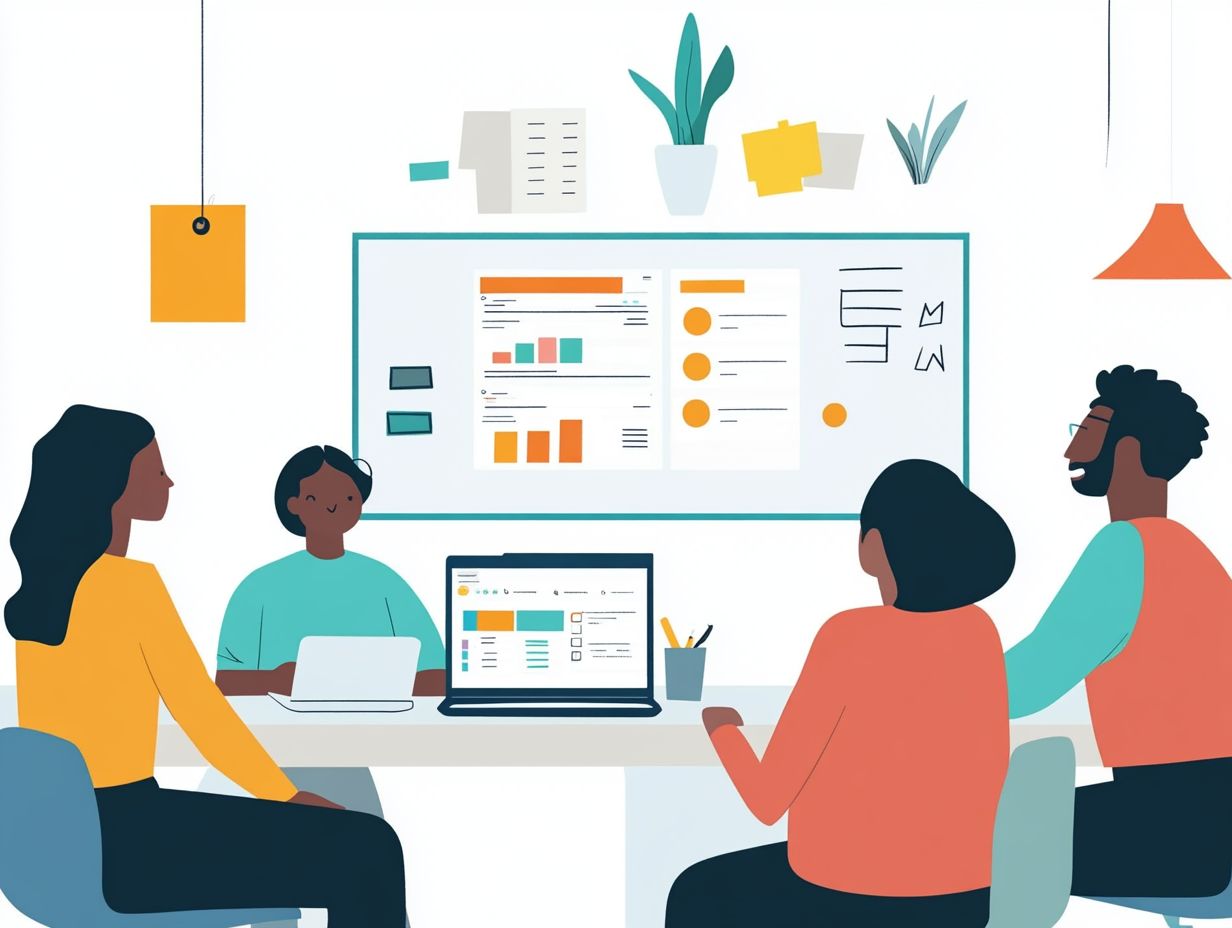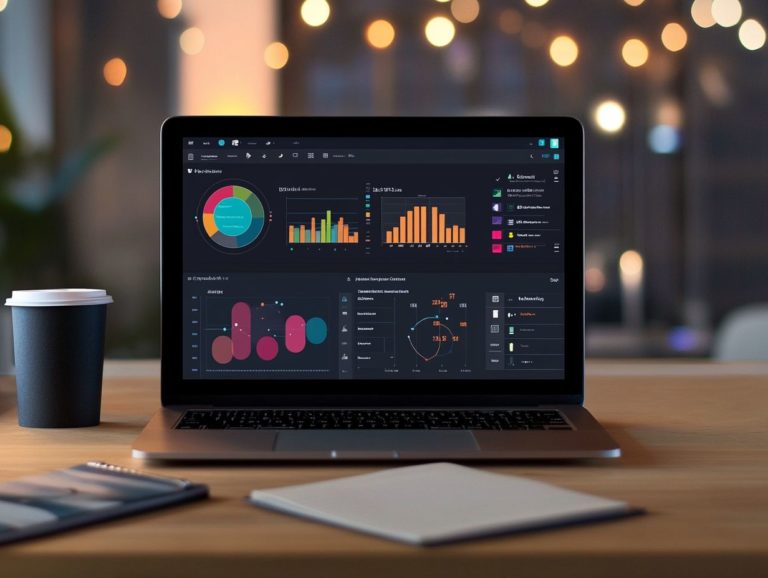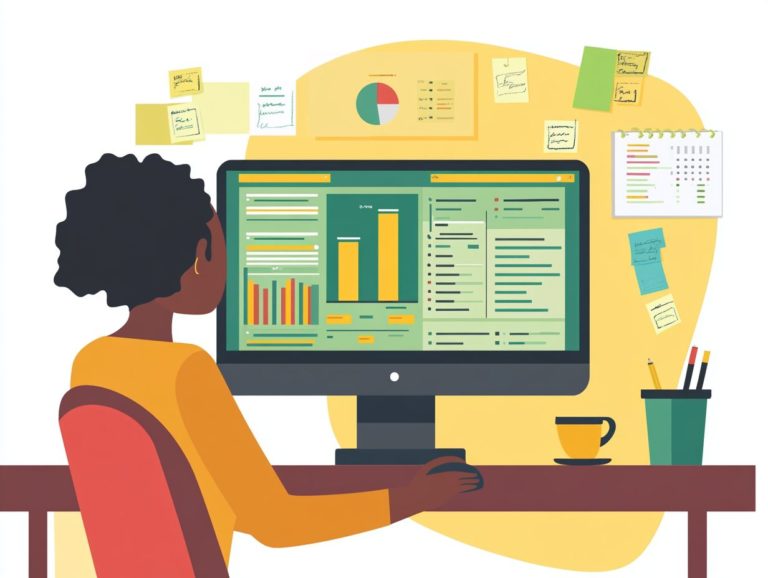4. How CRM Can Transform Nonprofit Organizations
Nonprofits like yours face unique challenges that can impede your mission. CRM, or Customer Relationship Management, is a game changer. It helps you manage relationships with your supporters, streamline operations, and boost fundraising efforts.
This article explores the vital role of CRM in nonprofits. You ll learn about common hurdles and the clear benefits of effective CRM implementation.
Real-life success stories show how organizations thrive by leveraging this technology. You’ll see increased engagement and a greater impact on their communities.
Contents
- Key Takeaways:
- The Role of CRM in Nonprofit Organizations
- Challenges Faced by Nonprofits
- How CRM Can Transform Nonprofit Organizations
- Implementing CRM in Nonprofit Organizations
- Success Stories of Nonprofits Using CRM
- Frequently Asked Questions
- 1. What is CRM and how can it benefit nonprofit organizations?
- 2. How can CRM improve donor relationships?
- 3. Can CRM help with fundraising efforts for nonprofits?
- 4. How can CRM streamline operations for nonprofits?
- 5. Are there different types of CRM systems available for nonprofits?
- 6. How can nonprofits implement CRM effectively?
Key Takeaways:

CRM significantly improves donor management, leading to better relationships and increased support. It saves time and resources, allowing nonprofits to focus on their mission.
With CRM implementation in nonprofit organizations, nonprofits enhance fundraising and marketing efforts, reaching a wider audience and boosting their impact.
The Role of CRM in Nonprofit Organizations
CRM is crucial for nonprofits to improve relationships with donors while enhancing operational efficiency, and following essential CRM practices can help achieve this.
A strong CRM system lets you manage donor profiles, track campaigns, and gain insights for better retention.
Using cloud-based software like Salesforce automates tasks and enhances volunteer management. This means you can optimize your fundraising goals and strategies more effectively.
Understanding CRM and its Benefits for Nonprofits
Understanding CRM is key for improving donor management. It helps you track interactions and preferences, ensuring you connect with supporters effectively.
A robust CRM streamlines operations and enhances outreach. These systems provide insights into donor behavior, allowing you to tailor your communications.
Automation is vital for managing workflows, freeing up staff to build genuine relationships. With improved communication and personalized outreach, you can enhance donor retention.
These elements work together to create a loyal donor base, greatly boosting your fundraising success.
Challenges Faced by Nonprofits
Nonprofits face significant challenges that can hinder effectiveness. Cost constraints may limit access to comprehensive CRM solutions, while manual processes can lead to inefficiencies.
Common Obstacles and Limitations
Common obstacles include donor churn and inadequate data management. Without a centralized database, tracking donations becomes difficult, leading to confusion about contributions.
These challenges can jeopardize fundraising revenue and erode trust among stakeholders. Consider using integrated donor management systems to address these issues.
By automating data entry and streamlining operations, you can enhance donor engagement and elevate your fundraising efforts.
How CRM Can Transform Nonprofit Organizations

CRM has the potential to revolutionize your nonprofit organization in three significant ways:
- By elevating your donor management and engagement strategies;
- By streamlining your operations and processes for greater efficiency;
- By enhancing your fundraising and marketing efforts to maximize impact.
Improving Donor Management and Engagement
Improving your donor management and engagement is essential if you want to elevate the donor experience. It s also crucial for boosting retention rates for your nonprofit organization.
By harnessing effective CRM software, you can track engagement metrics that offer invaluable insights into donor behavior and preferences. This data enables you to develop personalized communication strategies, ensuring your outreach efforts resonate with each individual supporter.
Tailored messaging cultivates a deeper connection and showcases your appreciation for their contributions. This significantly enhances their overall satisfaction.
As a result, organizations that prioritize effective donor management strategies are far more likely to foster long-term partnerships. Donors will feel valued and understood throughout their philanthropic journeys.
Streamlining Operations and Processes
Streamlining your operations and processes with CRM software can significantly reduce manual tasks. This boosts your operational efficiency.
By automating regular tasks like reporting and data management, you can allocate more time and resources to your core mission, allowing you to focus on what truly matters.
With powerful reporting capabilities at your fingertips, tracking progress and analyzing trends becomes a breeze. This leads to more effective campaign management, as the insights drawn from accurate data inform strategies that truly resonate with your audience.
Enhanced data health services ensure that the information you collect remains reliable and up-to-date. This enables better engagement with stakeholders and fosters stronger relationships with donors and volunteers alike.
Enhancing Fundraising and Marketing Efforts
Enhancing your fundraising and marketing efforts is absolutely vital for your nonprofit organization as you work toward achieving your goals and maximizing your outreach.
To elevate these efforts, leveraging CRM tools can be a game changer. These platforms enable you to create personalized email marketing campaigns that truly resonate with your supporters.
By effectively segmenting your audience, you can tailor messages and invitations based on individual interests and past interactions. This ensures that your communication is both relevant and impactful.
These tools streamline your campaign management by automating repetitive tasks like scheduling emails and tracking responses. This ultimately saves you precious time and resources.
With automation integrated into your strategies, you can focus on building strong relationships with your constituents. This leads to improved engagement and potentially unlocks greater funding opportunities.
Implementing CRM in Nonprofit Organizations
Implementing a CRM can transform the way your nonprofit operates! However, it demands meticulous planning and adherence to strategies for effective CRM in nonprofits to achieve optimal success.
Key Considerations and Best Practices

When considering implementing CRM systems in nonprofit organizations, several key factors and best practices should be on your radar to maximize effectiveness:
- Ensuring data security is essential. It s crucial to protect sensitive donor information from potential breaches, which are unauthorized access to confidential data.
- To enhance user adoption, tailored training sessions can enable your staff to utilize the system effectively. This cultivates a culture of collaboration and efficiency.
- Choosing CRM software that aligns with your organization’s unique needs is crucial for streamlining processes.
- Ongoing evaluation and adjustments after implementation are vital. Regularly assessing the system’s performance can lead to enhancements that better serve your organization’s goals.
Success Stories of Nonprofits Using CRM
Success stories of nonprofits using CRM systems highlight the transformative power of these tools, especially when incorporating must-have CRM features for nonprofits, in boosting fundraising revenue and enhancing engagement metrics.
By effectively harnessing these systems, organizations can unlock new levels of efficiency and impact. This drives their missions forward with measurable results.
Real-Life Examples and Results
Examples from nonprofit organizations using CRM systems reveal substantial improvements in engagement metrics and fundraising outcomes, especially when considering the 5 features to look for in nonprofit CRM.
For instance, organizations like Charity: Water and The American Red Cross have used these systems to refine their donor management processes. By implementing tailored strategies like personalized outreach and targeted fundraising campaigns, these nonprofits have seen notable increases in donor retention rates and overall contributions.
Metrics such as donor lifetime value and campaign response rates serve as concrete evidence of CRM’s positive impact. They illustrate how effectively these organizations can cultivate relationships.
The integration of CRM systems has dramatically improved operational efficiency and fostered deeper connections with supporters. This paves the way for sustainable growth in their missions.
Frequently Asked Questions
1. What is CRM and how can it benefit nonprofit organizations?
CRM stands for customer relationship management. It helps organizations manage interactions with customers and other stakeholders. For nonprofits, CRM improves donor relationships, increases fundraising efforts, and streamlines operations.
2. How can CRM improve donor relationships?

CRM helps track donor interactions and donations, allowing organizations to better understand their donors and personalize communication. This builds stronger relationships and increases donor retention rates.
3. Can CRM help with fundraising efforts for nonprofits?
Yes, CRM assists in identifying potential donors, segmenting them based on demographics or giving history, and creating targeted fundraising campaigns. It also tracks the success of these campaigns, helping organizations make adjustments for future efforts.
4. How can CRM streamline operations for nonprofits?
CRM centralizes data and communication, making it easier for team members to access and share information. It also automates tasks like sending donation receipts or scheduling volunteer shifts, saving time and resources for the organization.
5. Are there different types of CRM systems available for nonprofits?
Yes, there are different types of CRM systems designed specifically for nonprofits. Some focus on donor management, while others include features for volunteer and event management. It is important to research and choose the best fit for the organization’s needs.
6. How can nonprofits implement CRM effectively?
To implement CRM effectively, first assess the organization’s needs and goals. Then, choose a CRM system that aligns with those objectives and ensure that all team members are properly trained on how to use it. Regularly reviewing and analyzing data from the CRM can also help improve its effectiveness over time.
Ready to explore how CRM can transform your nonprofit? Start your journey today!






